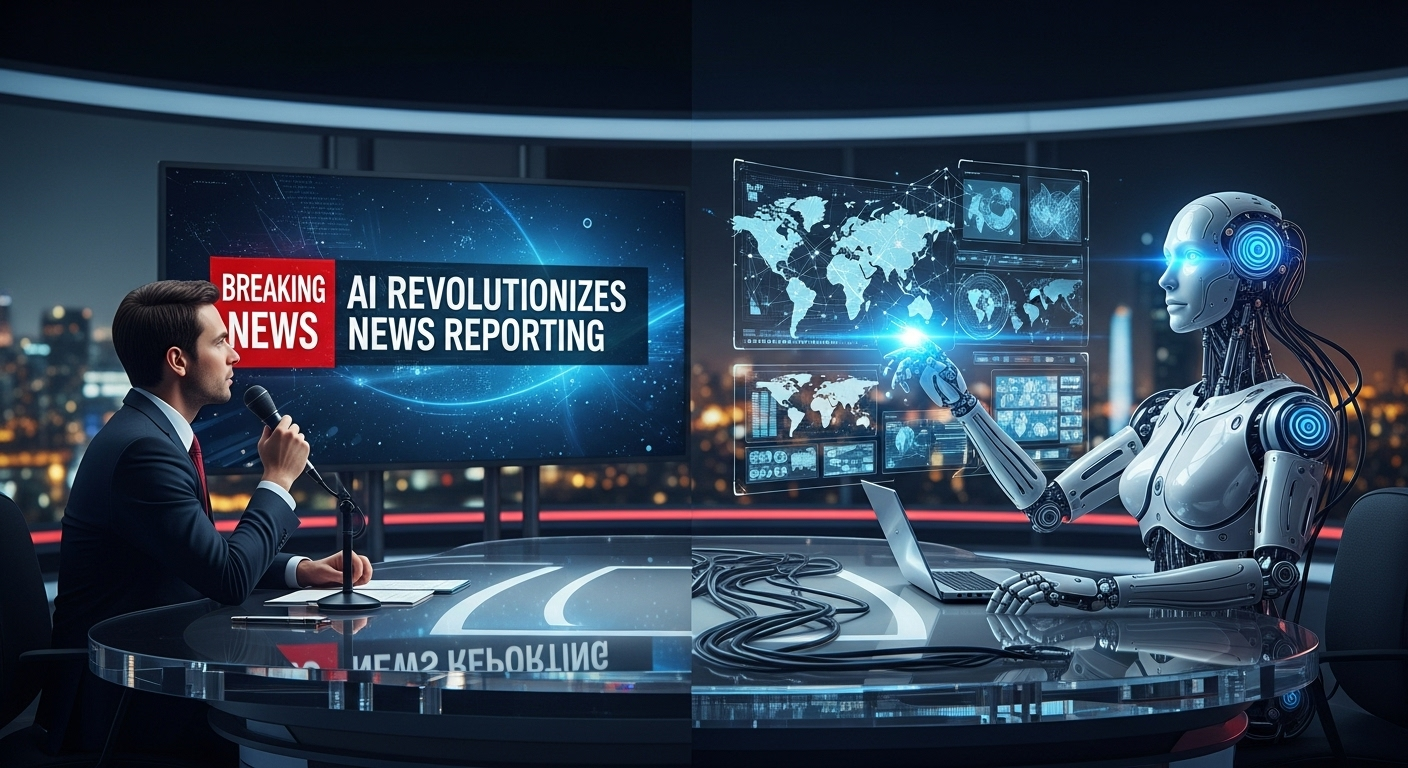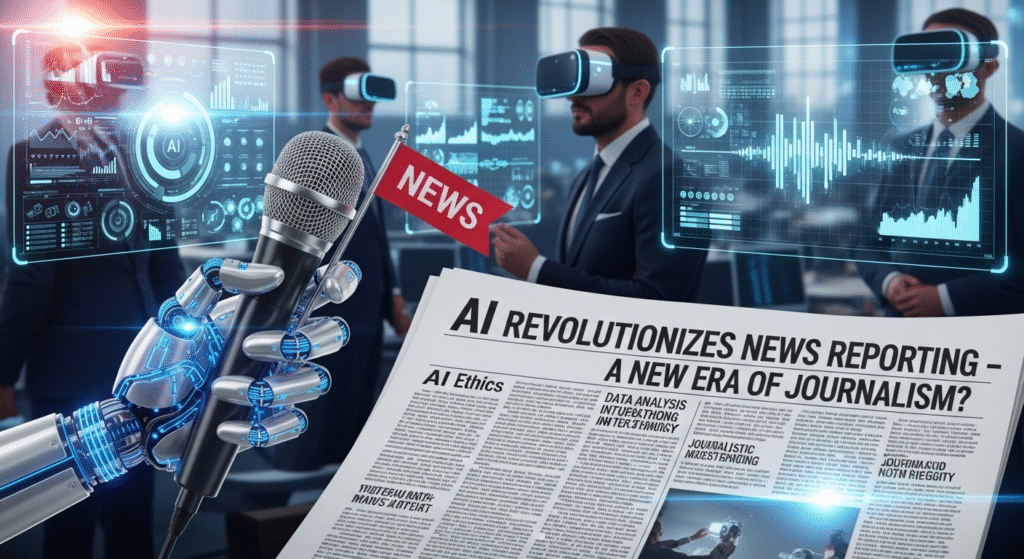Okay, let’s be honest. The headline practically writes itself these days, doesn’t it? “AI is changing everything!” But with news reporting, well, it feels a little different. It’s not just about faster data crunching (though there’s plenty of that). It’s about the very definition of journalism itself, isn’t it?
I remember when I first heard about AI writing sports recaps. Seemed harmless enough. But now? We’re talking about AI potentially crafting entire news stories. Actually, that’s not quite right. It is crafting entire news stories. The real question is, how good are they? And more importantly, what does it mean for the human journalists out there, grinding away on tight deadlines?
See, here’s the thing that keeps me up at night: News isn’t just about facts. It’s about context, nuance, and–dare I say it–even a little bit of soul. Can an algorithm really understand the subtle power dynamics at play in a local election? Can it convey the genuine heartbreak of a community dealing with tragedy?
The Rise of the Algorithmic Reporter

Let’s dive in. The use of AI in newsrooms is hardly new. For years, algorithms have been used to identify trending topics, fact-check articles, and even generate simple reports, like those sports recaps I mentioned. But now, we’re seeing a massive leap forward. AI tools can now analyze data, identify patterns, and generate entire articles with minimal human intervention.
And I’ve got to admit, this part fascinates me. Imagine the possibilities! Freeing up journalists to focus on investigative reporting, in-depth analysis, and, you know, actual human interaction. Think of the time savings!
But. There’s always a but, isn’t there? What about the potential for bias? What about the risk of errors? What about the impact on jobs? These are questions we simply can’t ignore.
Accuracy and Bias in AI-Generated News
Speaking of bias, it’s crucial to remember that AI is only as good as the data it’s trained on. If that data reflects existing biases (and let’s be honest, it almost always does), the AI will inevitably perpetuate those biases in its reporting. It’s like feeding it tainted information and expecting it to produce something pure.
Think about it this way: AI algorithms often rely on historical data to predict future events. If that historical data is skewed, the AI will likely make skewed predictions. And in news reporting, that could have serious consequences. Imagine an AI that consistently misrepresents the views of a particular community or reinforces harmful stereotypes. The result? More division, less understanding.
And then there’s the issue of accuracy. AI can certainly process information quickly, but it’s not always great at understanding context. This can lead to errors, misinterpretations, and even outright fabrications. The frustrating thing about this topic is the need for constant verification. It’s not set it and forget it.
Wait, there’s something even more interesting here… the concept of “hallucination” in AI. It’s not just about getting the facts wrong; it’s about the AI confidently asserting things that are completely made up. Seriously. And when that happens in news reporting? Well, you can see the problem.
The Human Element: What Gets Lost in Translation?
But even if we could somehow eliminate bias and ensure perfect accuracy (a big if, I know), there’s still something fundamentally important that AI can’t replicate: the human element. Journalism isn’t just about reporting facts. It’s about telling stories. It’s about connecting with readers on an emotional level. It’s about providing context, analysis, and perspective.
I keep coming back to this point because it’s crucial: Can an algorithm truly understand the human condition? Can it capture the complexities of human relationships? Can it convey the full range of human emotions?
During my five years working with communication platforms, I’ve seen the power of human connection firsthand. I’ve seen how a well-crafted story can change hearts and minds. I’ve seen how empathy and understanding can bridge divides. And I honestly don’t believe that an AI, no matter how sophisticated, can ever fully replicate that.
Also, while on the topic of the human element. I would like to mention that I like to play games in my free time to take a break.
Actually, that makes me think about journalism ethics. It’s a tricky area, even for experienced human reporters. What happens when an AI starts making ethical decisions? Who’s responsible when things go wrong? Who programs that ethical code? Are they the ultimate arbiters of truth? There are no easy answers, but these are questions we need to be asking.
Speaking of asking questions, check this out from Wikipedia. It has a ton of good information.
Navigating the Future of News
So, where does all this leave us? Is AI going to replace human journalists? I don’t think so. At least, not entirely. I think we’re more likely to see a hybrid model, where AI tools are used to augment and enhance the work of human journalists.
Think of it this way: AI can handle the routine tasks, like data analysis and report generation. This frees up journalists to focus on the more creative and strategic aspects of their work, like investigative reporting, in-depth analysis, and community engagement.
But – and this is a big but – we need to be incredibly careful about how we implement these technologies. We need to ensure that AI is used responsibly, ethically, and in a way that serves the public interest. We need to address the potential risks of bias, errors, and job displacement. It’s a delicate balance, but one that we absolutely must strike.
FAQ: AI and News – Your Burning Questions Answered
How do I know if a news story was written by AI?
That’s a tough one! It’s getting harder to tell the difference. One clue can be overly formulaic language or a lack of nuanced perspective. Look for repetitive sentence structures or a reliance on generic phrases. Another clue? A complete absence of any human voice or emotion. But honestly, the best way to be sure is to check the source. Is it a reputable news organization with a track record of accuracy? Or is it some shady website with questionable motives?
Why are news organizations using AI?
Mainly, it’s about efficiency and cost savings. AI can automate many of the time-consuming tasks associated with news reporting, freeing up journalists to focus on more important things. But it’s also about expanding coverage. AI can generate reports on topics that might not otherwise get attention, such as local events or minor crime incidents. It can also help news organizations reach a wider audience by translating articles into multiple languages.
Can AI help fight misinformation?
Potentially, yes. AI can be used to fact-check articles, identify fake news sources, and flag potentially misleading content. But it’s not a silver bullet. Misinformation is a complex problem that requires a multi-faceted approach. AI can be a valuable tool, but it needs to be used in conjunction with human judgment and critical thinking.
What are the ethical concerns of using AI in news?
Ah, now we’re getting to the heart of the matter. The biggest concerns are bias, accuracy, and transparency. As I mentioned earlier, AI algorithms can perpetuate existing biases if they’re trained on biased data. They can also make errors if they’re not properly programmed or if they lack sufficient context. And finally, it’s important to be transparent about when and how AI is being used in news reporting. Readers have a right to know whether they’re reading an article written by a human or an algorithm.
So, the AI revolution in news reporting? It’s here. And it’s complicated. But if we approach it with caution, critical thinking, and a healthy dose of skepticism, we might just be able to harness its power for good. Maybe. I’m cautiously optimistic.



